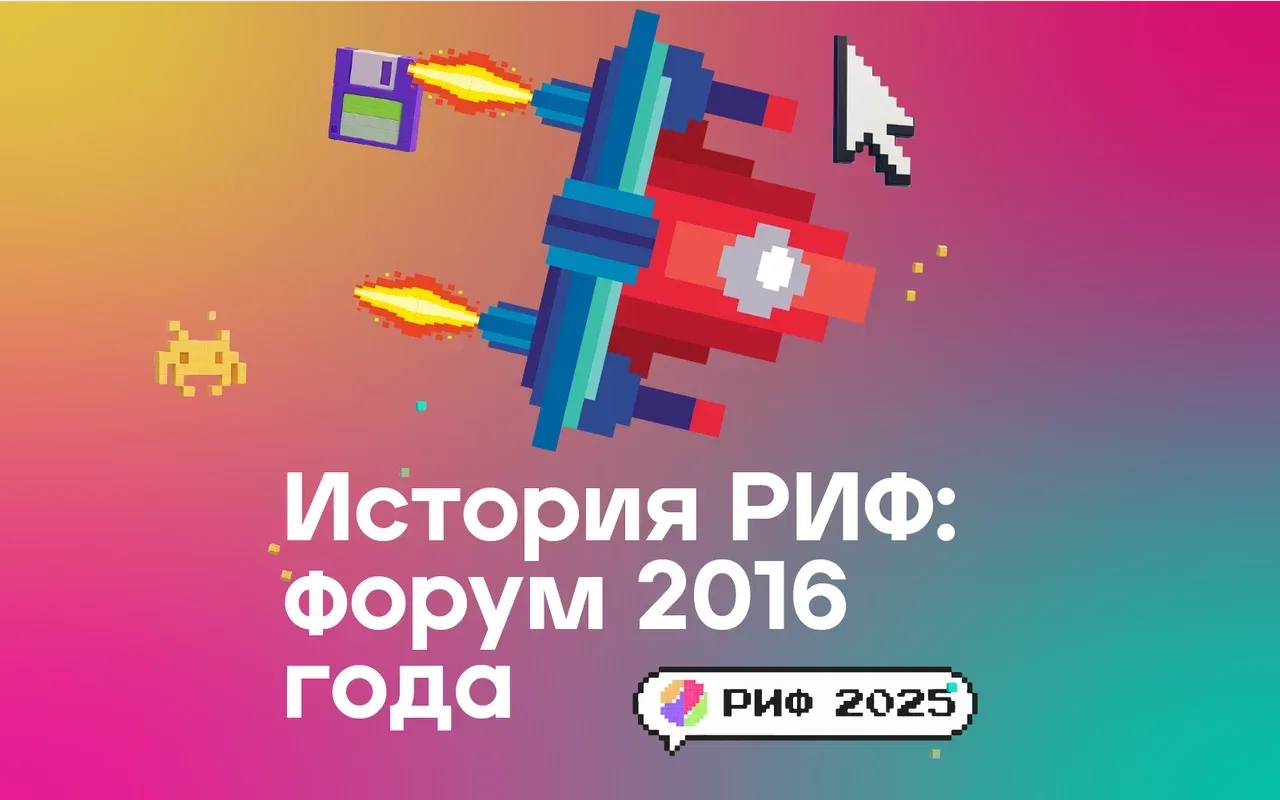RIF 2016: The Anniversary Year
In 2016, the Russian Internet Forum (RIF) marked its 20th anniversary. Year after year, it has retained the status of the leading event for Runet and digital business in Russia, where the industry’s energy, partnerships, and forward-looking strategies converge.

Pilgrimage Site for Runet
The 2016 program was vast as usual, packed into three days, across nine parallel halls and more than 100 two-hour sessions. Returning to the Lesnye Dali resort, the event brought together leading experts who shared practical tools and insights with 8,000 attendees.
For many participants, the forum had become a must-attend space: a place to meet high-profile decision-makers and niche specialists; to make new contacts and reinforce existing ones; to scout partners and fresh ideas; and to grasp how to ride the wave of emerging tech trends.
The main themes of the 2016 program included:
- 20 years of Runet through the lens of RIF
- The future of Runet: what to do 'tomorrow' and what awaits 'the day after'
- The 2016 Crisis Barometer: expert assessments and economic impact
- Internet+: the digitalization of the offline economy
- International cooperation: cybersecurity, infrastructure, standards
- Internet regulation: moving from restrictive to stimulating paradigms
Discussions covered mass internet accessibility and digital literacy, IT tools for small and medium enterprises, and new technologies in electronic payments. But this was only a slice of the wider conversations.
Coming of Age: Runet at 20
Back in the mid-1990s, Runet’s audience numbered just 400,000. Two decades later, it had transformed into a primary engine for business and career development. Statistics backed this sense of momentum:
- Runet’s audience reached 80.5 million users, up 9.2 % from the previous year.
- 57 % of those users went online daily, a year-on-year growth of 9.3 %.
- By 2020, forecasts predicted three-quarters of the Russian population would be online.
Nearly 90 % of young people relied on smartphones for browsing and messaging. Adults aged 25+ favored PCs and laptops. Average daily time online climbed to 148 minutes, of which 110 minutes were spent in mobile internet.
E-books, online services, and e-retail emerged as the fastest-growing markets. More than half of active users shopped online monthly. Some experts, based on Q1 data, even predicted a return to pre-crisis growth rates.
Marking the anniversary, forum organizers symbolically planted a lilac alley. Industry leaders also sought to give back: for the first time, RIF hosted an open class for schoolchildren called 'The Path to a Dream.' Executives from top IT companies shared life and business lessons with curious teenagers, underscoring what qualities and talents are most in demand, and what challenges lie ahead in self-realization.
For many students, these role models became personal inspirations. They admitted to following the blogs and interviews of these digital leaders, seeing them as maps for their own futures.
The Lighter Side of Tech
RIF 2016 also reminded everyone that tech culture thrives on play. A domain registrar handed out creative new domain names as memorable gifts.
More than 2,500 people generated some 7,300 posts about the forum, peaking on April 13, the opening day, when Minister Nikolai Nikiforov’s remarks became among the most widely shared quotes. True to social media trends, images—slides, selfies, landscapes of the resort, and quirky promo materials—dominated over text posts. Viral videos from the 'View from Below' project, where children explained what 'the internet' and 'RIF' meant, also circulated widely.
The wellness industry joined the anniversary celebrations. A juice company launched a playful campaign: bottles distributed to attendees carried portraits of 20 notable Runet figures, each paired with a description of their defining trait—creativity, eloquence, or leadership. Opening a bottle, attendees symbolically tapped into those qualities.
Gamification was everywhere. In the foyer, guests were invited to play League of Legends; others joined a quest in a themed room, tasked with reconstructing the life profile of an imaginary inhabitant—age, education, family, hobbies, income—within 10 minutes.
Some participants had earned their ticket by winning quarterly competitions in their companies. As one guest explained: 'The condition was to show the highest net project growth in three months. It wasn’t easy, but yes—it was absolutely worth it.'
And for a spectacular finale, RIF hosted Russia’s first Drone Grand Prix. Pilots raced drones at speeds over 150 km/h, wearing VR goggles to navigate the course. Both individual races and corporate tournaments turned the sport into a high-adrenaline showcase of how emerging tech can blend speed, vision, and entertainment.
Why It Matters
RIF 2016 was more than a birthday party. It was a snapshot of Runet’s maturation into a key growth sector of the Russian economy, with global ambitions.
The forum highlighted how far connectivity, digital tools, and mobile technologies had penetrated Russian society, and how they were reshaping markets from retail to media. By engaging both schoolchildren and CEOs, RIF underscored a simple idea: the future of Runet depends as much on people as on platforms.
And with its foray into drones, gamification, and even wellness branding, RIF demonstrated that innovation is not confined to code or policy—it is about creating experiences that capture imagination and expand possibilities.
In short, Runet at 20 showed it was not only surviving but thriving, charting a course where technology serves both business and society.

